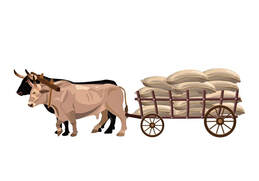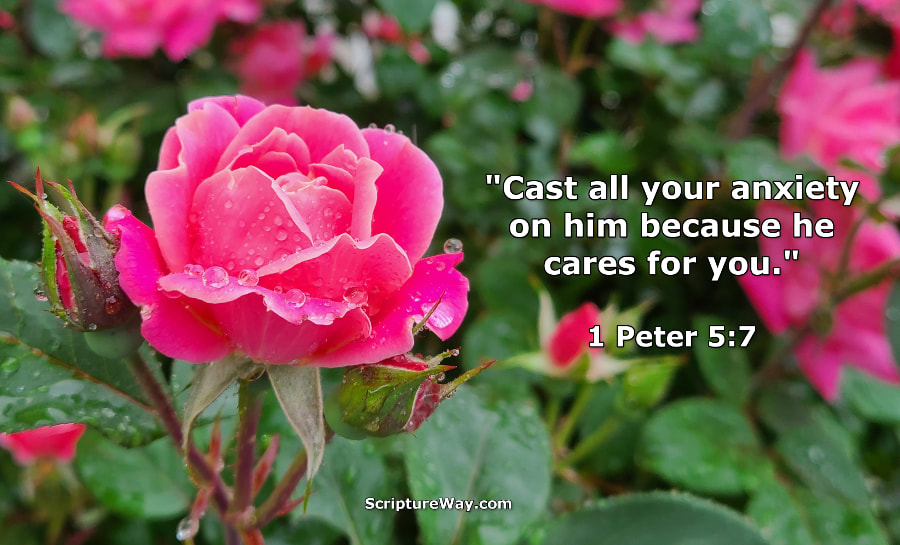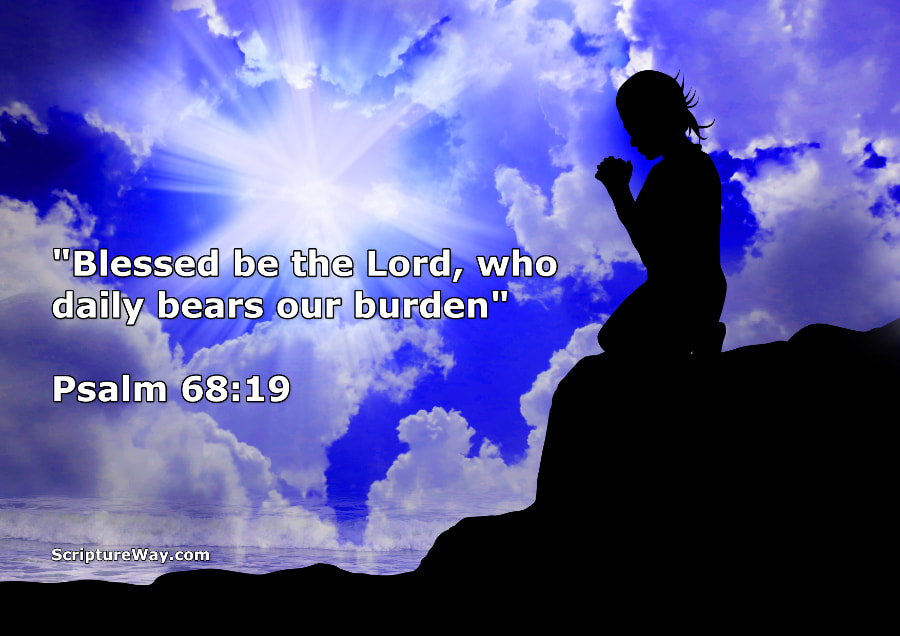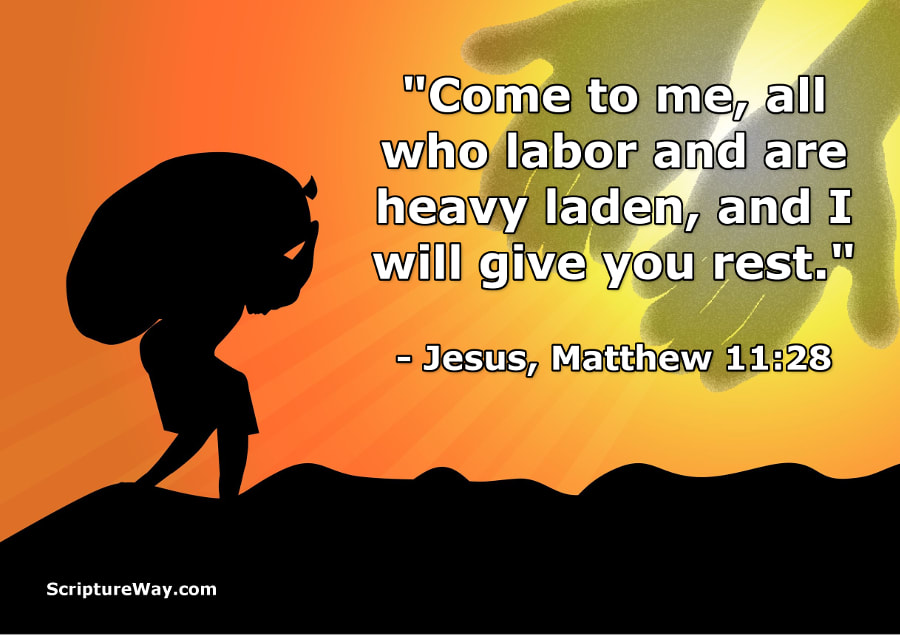(6) "Therefore humble yourselves under the mighty hand of God, that He may exalt you at the proper time, (7) casting all your anxiety on Him, because He cares for you." (1 Peter 5:6-7 NASB)
Consider. God willingly desires for us to cast all our anxiety on him. Have you cast all your anxiety -- all your worry and care -- on God?
Introduction
The Apostle Peter is writing to Jewish and Gentile Christians in Asia Minor (1 Peter 1:1-3). Peter recognizes that they are suffering for being Christians (1 Peter 4:12-19), and he advises them, "If you suffer as a Christian, do not be ashamed, but praise God that you bear that name" (1 Peter 4:16). Peter exhorts the elders in the churches to be witnesses of Christ's sufferings and to be shepherds of God's flock (1 Peter 5:1-2). He encourages young people to be subject to their elders, and he instructs all of them (and us today) to clothe themselves (ourselves) with humility because, "God opposes the proud but gives grace to the humble" (1 Peter 5:5).
Casting our anxiety on God and humility go together
Sometimes when we are anxious and are looking for an encouraging verse in the Bible such as 1 Peter 5:7, we might miss the point that humility and casting our anxiety on God go together. Peter begins verse 6 with "Humble yourselves under the mighty hand of God" (1 Peter 5:6). Then, in verse 7 he adds "casting all your anxiety on him" (1 Peter 5:7). The Greek word for "humble" in 1 Peter 5:6 is tapeinoó (pronounced tap-i-no'-o) and means to make low (Ref. 1) or being willing to take a low place (Ref. 2). When we humble ourselves before God, we recognize that we are not reliant on ourselves only but are dependent on God. God is the one who fills us, who lifts us up, and who cares for our every need (Ref. 3, Acts 1:8, Ephesians 5:18, James 4:10, Philippians 4:19, 1 Peter 5:7).
Casting is like throwing
The Greek word for "casting" in 1 Peter 5:7 is epiriptó (pronounced ep-ir-hrip'-to) and means to throw (Ref. 4). This word in Greek occurs only twice in the New Testament (Englishman's Concordance - Ref. 4). Before Jesus' triumphant entry into Jerusalem, Luke tells us, "They brought it (the colt) to Jesus, and they threw [cast] their coats on the colt and put Jesus on it" (Luke 19:35, parentheses and brackets added). In the same way the disciples throwing their coats on the colt was a one-way trip for the coats, casting our anxiety on Jesus should be a one-way trip for our anxiety.
We are to cast all of our anxiety -- not just parts of it -- on the Lord
In 1 Peter 5:7 the Greek word for "anxiety" is merimna (pronounced mer'-im-nah) which means cares and worries -- anything that fractures and divides a person's (our) being into parts (HELPS Word-studies - Ref. 5). In 1 Peter 5:7, merimna [anxiety] is singular and unites all of our cares and worries into one whole (Ref. 5, Ref. 6). Jesus' explanation of the parable of the sower in Matthew uses the same singular form of merimna. "And the one on whom seed was sown among the thorns, this is the one who hears the word, and the worry [anxiety] of the world and the deceitfulness of wealth choke the word, and it becomes unfruitful (Matthew 13:22, brackets added). The fact that our anxiety -- the whole of it -- chokes the fruitfulness of God's word in us is a good reason for us to accept God's invitation to cast all our anxiety on him.
Because he cares for us
Peter gives the reason why we are to cast all our anxiety on the Lord -- because he cares for us (1 Peter 5:7). The Greek verb translated as "cares" in this second part of 1 Peter 5:7 is meló (pronounced mel'-o) and means pays attention to, is concerned about, gives thought to (Ref. 7). The God who cares for the sparrows cares for us as well (Matthew 6:26, Matthew 10:29-31). David wrote, "But I am poor and needy; yet the Lord thinketh upon me" (Psalm 40:17 KJV). The God who loves us so much that he gave his Son to die for us invites us and welcomes us to cast all our anxiety on him (John 3:16, Romans 5:6-8, Psalm 55:22, 1 Peter 5:7).
Apply. The main way we cast our anxiety on God is to pray to, thank, and trust God. Pray to God and tell him your needs. Thank him for his answers (Philippians 4:6-7). (Have a continual "attitude of gratitude.") Trust God that he will take care of your concern according to his will and timing (1 John 5:14). Tell others how God has answered your prayers (Psalm 66:16). Your testimony describing how God has helped you will encourage others. Pray, thank, trust, and tell.
Related Lessons:
"Psalm 37:5 Meaning - Commit Your Way to the Lord" "The Peace of Believing Prayer (Philippians 4:6-7)" "Blessed Be the Lord Who Daily Bears Our Burden" -- Psalm 68:19 "Jesus' Invitation - Come to Me and Rest" -- Matthew 11:28
References:
1. https://biblehub.com/greek/5013.htm 2. https://biblehub.com/commentaries/barnes/1_peter/5.htm Barnes' Notes on the Bible - 1 Peter 5:6 3. https://biblehub.com/greek/5312.htm 4. https://biblehub.com/greek/1977.htm 5. https://biblehub.com/greek/3308.htm 6. https://biblehub.com/commentaries/meyer/1_peter/5.htm Meyer's NT Commentary on 1 Peter 5:7 7. https://biblehub.com/greek/3199.htm
2 Comments
This lesson explains how God, our majestic Lord, willingly comes beside us and invites us to cast our burdens upon him.
Consider. What burdens, or load, are you carrying today? God is willing to share your burdens. Will you cast your burdens upon God today?
God as Our Majestic Lord
The same God who is willing to carry our burdens is also our majestic Lord. In the first half of Psalm 68 (Psalm 68:1-18), we see David's emphasis describing the majesty and power of God. The name, Lord, is the English translation of the Hebrew word, Adonay (ad-o-noy'), and is a proper name for God (Psalm 68:17-19, Ref. 1). See in your mind the image of God leading his people in the wilderness, with cloud by day and fire by night (Psalm 68:7, Exodus 13:21). See in your mind thousands upon thousands of angels and chariots attending God in holiness at Sinai (Psalm 68:17, Deuteronomy 33:2). See in your mind the day the Bible describes in Psalm 68:18 and Ephesians 4:8 when Christ ascended on high leading a host of captives.
God as Our Burden Bearer
Notice the abrupt change in verse 19 to the wonderful thought, "Blessed be the Lord, who daily bears our burden" (Psalm 68:19). God, the Lord (Adonay), is blessed (adored with bended knees) and daily (day by day, continually) bears our burden (carries our load) (Ref. 1, Ref. 2, Ref. 3, Ref. 4). The same God who majestically led his people through the wilderness comes beside us today and willingly carries our baggage. "What a thought that is - a God that carries men's loads!" (Alexander MacLaren, Ref. 5, Ref. 6).
The ultimate fulfillment of "Blessed be the Lord, who daily bears our burden" (Psalm 68:19), occurs in God's Son, Jesus Christ. Isaiah prophesied, "Surely he has borne our griefs and carried our sorrows" (Isaiah 53:4). The Apostle Peter writes, "He himself bore our sins in his body on the cross" (1 Peter 2:24). Jesus invites us, "Come to me, all you who are weary and burdened (weighted down), and I will give you rest" (Matthew 11:28, italics added, Ref. 7, Ref. 8). For those who trust in him, Jesus Christ is our Lord and our burden-bearing Savior. What We Should Do with Our Burdens - Cast and Release them onto the Lord
God lovingly invites us to cast our burdens onto him. God wants us to cast our burdens on him because he cares. Psalm 55:22 says, "Cast your burden upon the Lord and He will sustain you; He will never allow the righteous to be shaken." 1 Peter 5:7 says, "Cast all your anxiety on him because he cares for you."
In both the Old Testament and the New Testament cast means to throw or fling (Ref. 9, Ref. 10). The two disciples who brought the colt to Jesus cast (threw) their outer garments (cloaks, robes) onto the young animal in their reverence and love for their Lord before Jesus rode into Jerusalem (Luke 19:35, Ref. 10, Ref. 11, Ref. 12). Unlike fishing where we cast our weighted line into the sea and then pull it back to cast it again, casting our burdens on the Lord should be a one-way trip -- "cast and release," not "cast and retrieve." Let God help you. Cast (throw) your burdens onto the Lord, and release them to him. Trust him to carry your load (Psalm 68:19). He will care for you (1 Peter 5:7). He will sustain you (Psalm 55:22). He will give you rest (Matthew 11:28).
Apply. Whatever your burdens are, take them to the Lord in prayer. Cast all of your burdens upon him, and trust him to carry your load.
Related Lessons
"Cast All Your Anxiety on Him" - 1 Peter 5:7 "Jesus' Invitation - Come to Me and Rest" (Matthew 11:28-30)
References
1. https://biblehub.com/hebrew/136.htm 2. https://biblehub.com/hebrew/1288.htm 3. https://biblehub.com/commentaries/hastings/psalms/68-19.htm 4. https://biblehub.com/hebrew/6006.htm. 5. https://biblehub.com/commentaries/maclaren/psalms/68.htm 6. https://en.wikipedia.org/wiki/Alexander_Maclaren 7. https://biblehub.com/greek/5412.htm 8. http://www.scriptureway.com/home/jesus-invitation-come-to-me-and-rest 9. https://biblehub.com/hebrew/7993.htm 10. https://biblehub.com/greek/1977.htm 11. https://biblehub.com/greek/2440.htm 12. https://biblehub.com/commentaries/vws/luke/19.htm
"Come to me, all who labor and are heavy laden, and I will give you rest. Take my yoke upon you, and learn from me, for I am gentle and lowly in heart, and you will find rest for your souls. For my yoke is easy, and my burden is light." (Matthew 11:28-30)
This lesson explains Jesus' invitation in Matthew 11:28, "Come to me, all who labor and are heavy laden, and I will give you rest."
This lesson is the third in a series on God's Invitations in the Bible, specifically, the "Comes" of God's word. The first lesson in the series is "Come Now, Let Us Reason Together (Isaiah 1:18)" (Ref. 1). The second lesson is "Come to the Waters (Isaiah 55:1)" (Ref. 2).
Consider. What heavy burden is weighing you down today?
Come to me, all who labor and are heavy laden
If you are weary (literally, exhausted from labor), then Jesus' invitation is for you (Ref. 3). If you are weighted down with a heavy burden such as worry, sin, or sorrow, then Jesus' invitation is for you. To receive the rest that Jesus promises, please accept his invitation and come to him in faith.
Jesus who says "Come to me, all who labor and are heavy laden" is the same God who says "Come, everyone who thirsts" (Isaiah 55:1) and "Come now, let us reason together" (Isaiah 1:18). Jesus also says, "All that the Father gives me will come to me, and whoever comes to me I will never cast out" (John 6:37). I will give you rest
Jesus himself is the Rest Giver (Ref. 4). Jesus can dispel your fear and give you peace (John 14:27). Jesus forgives our sin (1 John 1:9) and gives us a clean conscience (Hebrews 10:22). When you come to Jesus, he will give you that rest.
Take my yoke upon you, and learn from me Yoked Oxen Pulling a Loaded Cart - 123RF Image Yoked Oxen Pulling a Loaded Cart - 123RF Image
HELPS Word-studies defines a yoke as a wooden bar placed over the neck of a pair of animals so they can pull together (see illustration). Figuratively, a yoke is what unites (joins) two people to move (work) together as one (Ref. 5).
Notice that in Matthew 11:28-29 Jesus gives us a two-part summons. Our response to both parts is needed for a full Christian life. In the first part (as we discussed above), Jesus invites us to come to him for pardon, refreshment, and rest. In the second part, Jesus asks us to take on his yoke -- to submit our will to him, to learn from him, to obey him, to serve him, and to become like him (Ref. 4). Coming to Jesus is not just a one-time experience -- it is for a lifetime. Coming to Jesus includes willingly taking on the yoke of Jesus by learning from him and serving him the rest of our lives in an ongoing relationship. Are you willing to submit to his yoke? You will find rest for your souls
Jesus promises that when we take his yoke upon us by accepting his teaching and by serving him that we will find rest for our souls. The Greek word here for rest means inner rest (tranquility) (Ref. 6). Jesus quotes the prophet Jeremiah, "Thus says the Lord: 'Stand by the roads, and look, and ask for the ancient paths, where the good way is; and walk in it, and find rest for your souls'" (Jeremiah 6:16).
My yoke is easy, and my burden is light
Jesus contrasts his yoke to the heavy burden of minute legal observances that the scribes and Pharisees of that time put on the shoulders of the Jewish people (Matthew 23:1-4, Acts 15:10, Ref. 7). In contrast, Jesus says that "my yoke" (literally, the yoke of Me) "is easy" (gentle, pleasant, kind) "and my burden" (literally, the burden of Me) "is light" (of little weight and easily carried) (Ref. 8, Ref. 9, Ref. 10).
Key Questions.
Apply. In prayer, give your heavy burden to Jesus. Receive from him the rest that he promises. Submit your will to him, and willingly receive his yoke of instruction. Serve Jesus gladly, joyfully yoked with him in an ongoing relationship.
Related Lessons
"Our Burden-Bearing God (Psalm 68:19)" "Come to the Waters (Isaiah 55:1)" "Come Now, Let Us Reason Together (Isaiah 1:18)"
References
1. http://www.scriptureway.com/home/come-now-let-us-reason-together-isaiah-118 2. "Come to the Waters (Isaiah 55:1)" at the link below: http://www.scriptureway.com/home/gods-great-invitation-come-satisfy-your-thirst 3. https://biblehub.com/greek/2872.htm 4. https://biblehub.com/commentaries/maclaren/matthew/11.htm 5. https://biblehub.com/greek/2218.htm 6. https://biblehub.com/greek/372.htm 7. https://biblehub.com/commentaries/pulpit/matthew/11.htm 8. https://biblehub.com/interlinear/matthew/11-30.htm 9. https://biblehub.com/greek/5543.htm 10. https://biblehub.com/greek/1645.htm |
Daily Bible Verse(Click the link above) AuthorMr. Whitney V. Myers. Christian. For more information, please visit the Author Page. Posting ScheduleI plan to provide new postings about once a month. Planned Topics(subject to change) Recent Posts(most recent three months) Popular Posts(top 10) Categories
All
Archives
July 2024
|
|
Copyright 2018-2024 Whitney V. Myers |
Listed in Feedspot's Top 100 Bible Study Blogs and Websites |



 RSS Feed
RSS Feed
